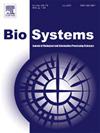用统计力学方法研究蛋白质分子的折叠态和未折叠态之间的跃迁。
IF 1.9
4区 生物学
Q2 BIOLOGY
引用次数: 0
摘要
一个理论研究提出了在水环境中使用统计力学框架的蛋白质分子的展开和折叠状态之间的过渡。该模型构建了一个典型系综,其中蛋白质分子被视为与模拟水合作用的有效静电场相互作用的电偶极子。正则配分函数是通过对偶极子取向进行积分而得到的,它与热力学量(如自由能、内能、焓和热容)有解析关系。为了纳入化学环境的影响,该模型通过引入质子逸度概念的ph依赖行为扩展到一个大正则系综。分析了不同温度条件下pH值对热稳定性的影响。所有理论表达式均适用于溶菌酶在0-6 pH范围内的实验量热数据。结果表明,在酸性条件下,折叠态是热力学有利的,其特征是焓变为负,热容降低。相反,在较高的pH水平下,未折叠态占主导地位。这种方法成功地捕获了折叠转变的焓特征,并为水合作用对蛋白质稳定性的协同效应提供了有价值的见解。本文章由计算机程序翻译,如有差异,请以英文原文为准。
Investigation of the transition between the unfolded and folded states of the protein molecules by using statistical mechanical methods
A theoretical investigation is presented into the transition between the unfolded and folded states of protein molecules in aqueous environments using a statistical mechanical framework. The model constructs a canonical ensemble in which protein molecules are treated as electric dipoles interacting with an effective electrostatic field that simulates hydration effects. The canonical partition function is derived by integrating over dipole orientations and is analytically related to thermodynamic quantities such as free energy, internal energy, enthalpy, and heat capacity. To incorporate the influence of the chemical environment, the model extends to a grand canonical ensemble by introducing pH-dependent behavior through the concept of proton fugacity. The impact of pH on enthalpic stability is analyzed across multiple temperature conditions. All theoretical expressions are fitted to experimental calorimetric data reported for lysozyme within the pH range of 0–6. The results demonstrate that the folded state is thermodynamically favorable under acidic conditions, characterized by negative enthalpy changes and reduced heat capacity. In contrast, the unfolded state becomes dominant at higher pH levels. This approach successfully captures the enthalpic features of folding transitions and provides valuable insights into the cooperative effects of hydration on protein stability.
求助全文
通过发布文献求助,成功后即可免费获取论文全文。
去求助
来源期刊

Biosystems
生物-生物学
CiteScore
3.70
自引率
18.80%
发文量
129
审稿时长
34 days
期刊介绍:
BioSystems encourages experimental, computational, and theoretical articles that link biology, evolutionary thinking, and the information processing sciences. The link areas form a circle that encompasses the fundamental nature of biological information processing, computational modeling of complex biological systems, evolutionary models of computation, the application of biological principles to the design of novel computing systems, and the use of biomolecular materials to synthesize artificial systems that capture essential principles of natural biological information processing.
 求助内容:
求助内容: 应助结果提醒方式:
应助结果提醒方式:


